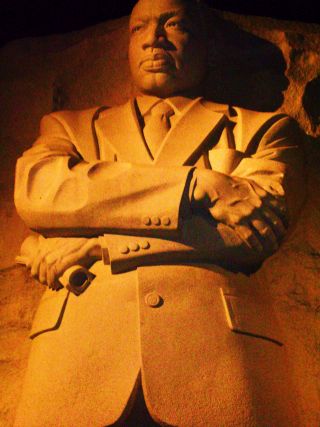Martin Luther King's Philosophy on Investing
This article was originally posted on the Street Insight section of thestreet.com 1/31/2006 2:26 PM EST.

As one of capitalism's staunchest defenders, Dr. King sought to bring a level playing field to capital markets.
He was also a socially responsible investor who focused on specific values.
First, I would like to offer condolences to the family of Coretta Scott King after her death last night at the age of 78. Her commitment to Dr. King's legacy is well known, as is her commitment to civil rights.
Capitalism and Equality
As the civil rights movement expands to include investing and investments, I thought it would be an appropriate time to reflect on Martin Luther King, Jr.'s attitude toward investing. Though it may surprise some, Dr. King was one of capitalism's staunchest proponents. In this respect, his actions were fully consistent with his faith: as he noted in one of his speeches, "Jesus never made a universal indictment against all wealth." What's more, Dr. King's work made capital markets more efficient, as I discuss below.
A Socially Responsible Investor
Martin Luther King was more concerned with how wealth was obtained and used. To him, the fact that one owned a Cadillac said nothing about one's faith or about one's character, for that matter. Worshiping the Cadillac, however, did. This certainly made him a socially responsible investor, specifically a values investor. His emphasis on values rested on a concern he expressed many times, that "material means have outdistanced spiritual ends, (does anyone really need a Gucci handbag?), that mentality has outdistanced morality (Enron), and that civilization has outdistanced culture." (The Hilton Twins, some popular music, and most reality TV).
Community Investing
Dr. King believed in both the power of community and in the power of the market. In fact, economic development projects started by Dr. King laid the foundation for future initiatives in socially responsible investing. Operation Breadbasket in Chicago combined ongoing dialog with boycotts and direct action targeting specific corporations. His efforts also strengthened and developed three African American banks, two in Chicago and one in Cleveland.
Finally, Dr. King helped people realize the economic power of their own spending. Or as he put it, "If you respect my dollar you must respect my person." As I noted in one of my earlier articles, I like Carver Bancorp (CNY). Carver is a small-cap bank operating in Harlem that is African-American owned. The bank has strong management, a solid balance sheet, and is well positioned to benefit from the continuing development of the Harlem real estate market.
Economic Impact
Martin Luther King's work also supported domestic economic growth. By my estimate, the elimination of Jim Crow laws and reduced employment discrimination boosted the U.S. economy by $20 trillion dollars over the 20 years after King's death. (This includes domestic spending and productive capacity between 1970 and 1990.) By contrast, in 2002 the Federal Reserve Board estimated that $8 trillion in stock market wealth had been lost over the previous two and a half years due to the impact of corporate malfeasance and fraud. This certainly puts the bursting of the tech bubble in perspective.
From the U.S. to Sudan
Dr. King was also an international investor: he was concerned about human rights in Africa, and I believe that he would have agreed with a boycott of companies doing business in the Sudan. Since 2003 hundreds of thousands of Africans have died in the Darfur region in a massive genocide. I believe that these events would have led Dr. King to initially boycott, and then to support firms like Talisman Energy (TLM). Talisman is a Canadian oil company that initially resisted calls to stop doing business in the Sudan. The company has since suspended its operations there after a concerted effort by institutional investors. Talisman's move out of the Sudan is looking smarter every day given new boycotts on firms doing business there, and after recent attention on the subject by large pension funds like the New York City Funds.
I think Dr. King and Ms. King would be pleased.
Notes:
1) "Why Jesus Called A Man A Fool", A Knock At Midnight: Inspiration from the Great Sermons of Rev. Martin Luther King. Warner Books, 1998, page 148.
2) "Rediscovering Lost Values". Ibid. Page 11.
3) "Paul's Letter To American Christians". Ibid. Page 27.
4) "Remarks by Chairman Alan Greenspan". Before the Council on Foreign Relations, Washington, D.C. November 19, 2002. Online at: http://www.federalreserve.gov/boarddocs/speeches/2002/20021119/default.htm
5) "The Birth of a New Nation", A Call to Conscience: The Landmark Speeches of Dr. Martin Luther King, Jr. Edited by Clayborne Carson and Kris Shepard. Warner Books, 2001, page 18.




